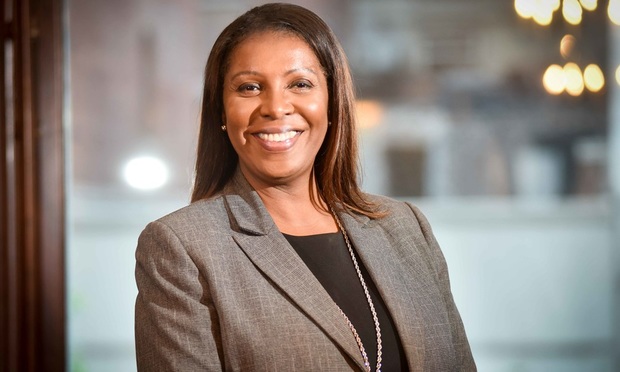NY AG Candidate Questionnaire: Letitia 'Tish' James, Democrat, New York City Public Advocate
"First and foremost, the attorney general needs original jurisdiction to prosecute public corruption, without a referral from the governor, the comptroller, or an agency head."
October 25, 2018 at 02:06 PM
10 minute read
 Letitia James. Photo Credit: David Handschuh/ALM
Letitia James. Photo Credit: David Handschuh/ALM
Voters in New York state are set to choose their next state attorney general in less than two weeks on Tuesday, Nov. 6.
The office, currently held by Attorney General Barbara Underwood, has tremendous power to litigate both state and federal issues involving many players, from a business owner in Buffalo to President Donald Trump.
New York City Public Advocate Letitia “Tish” James, a Democrat, is seeking to become the next person to hold the office. She would be the first woman and person of color elected to the position.
James started her career as a public defender with the Legal Aid Society. Since then, she's been elected to the New York City Council and has served as the New York City public advocate since 2014.
The New York Law Journal developed a series of questions relevant to our readers and voters statewide and sent identical versions to both James and her Republican opponent, Ropes & Gray partner Keith Wofford.
Wofford's answers to our Candidate Questionnaire may be read here.
Here are the answers we received from James, edited only to conform to NYLJ and ALM style.
How would you organize and staff the office and secure proper resources and authority to reflect your priorities?
- Should the powers of the Attorney General's Office be expanded? Are there any areas where the tools afforded by the Legislature to the AG are too limited?
Yes, without a doubt. First and foremost, the attorney general needs original jurisdiction to prosecute public corruption, without a referral from the governor, the comptroller, or an agency head. The Legislature should also codify the attorney general's role as special prosecutor when police officers kill unarmed civilians. This mandate should also be expanded to include when civilians are grievously injured in interactions with police officers and when police officers allegedly commit hate crimes or sexual assault. And now that the Court of Appeals has ruled that the Martin Act's statute of limitations is three years, it's clear the Legislature must extend the statute of limitations to six years.
- Are there any bureaus of the Attorney General's Office that you think are currently underutilized?
Attorney General Underwood is doing tremendous work on cases involving the Trump administration—from the lawsuit against the Trump Foundation for violations of campaign finance laws and self-dealing to challenging rollbacks of key environmental regulations and the Affordable Care Act. I will continue that work, while at the same time doubling down on rooting out public corruption in Albany and taking on the housing crisis.
We will both boost the resources dedicated to the “Operation Integrity” anti-corruption task force with the Comptroller's Office and explore new ways to use existing powers under Executive Law 63(12), the False Claims Act, and the attorney general's broad oversight of nonprofits to take on legislators, businesses, and charities involved in self-dealing. We will also build the Housing Bureau's capacity, so we can better protect New Yorkers in regards to rent protections, zombie properties, predatory lending, improper foreclosures, tenant harassment, and more.
- Are there any particular divisions of the office or resources that you would like to reallocate or reduce?
The Attorney General's Office is a high-functioning law firm with hundreds of attorneys. But we can always do better—and I think we can modernize the focus of some parts of the office. We must explore how new technologies can be put to use by the office, for example, by automating co-op/condo conversion applications. We must also ensure there is better coordination among regional offices and between these offices and the various bureaus.
- Are there areas of the state that you view as underserved where you would like to open or beef up regional offices?
As a former assistant attorney general in charge of a regional office, I know how important these outposts are. They serve as a direct line of communication between constituents and the office, and they help spot trends like an uptick in consumer fraud before they become crises. I will certainly explore expanding the role and the reach of regional offices, and looking at how regional offices can collaborate with legal services providers when I'm attorney general.
What is the proper scope of the attorney general's power to punish and deter public officials' misconduct?
- Does the office need broader grants of authority to stamp out corrupt practices in Albany?
Yes. Unequivocally. When I am in office, I will push the Legislature to give the attorney general original jurisdiction over public corruption—but I won't wait for them to act. I will explore creative ways to use existing powers to tackle corruption, including beefing up the “Operation Integrity” anti-corruption task force with the Comptroller's Office and using Executive Law 63(12), the False Claims Act, and the attorney general's oversight of nonprofits.
- The Legislature approved a new commission to investigate prosecutorial misconduct by the state's district attorneys this year. Do you support such a commission and do you think the AG's office should also be subject to its review?
Yes, I do support the commission. The creation of this commission was long overdue. As a former public defender, I know that the vast majority of prosecutors are committed to enforcing the law and ensuring that justice is done, but I am also mindful of the immense power that every prosecutor holds. This legislation balances those two needs, and makes our system of justice more fair.
What is the proper role of the attorney general in addressing gender power imbalances?
- What should be the attorney general's role in addressing sexual harassment in both the private and public sectors?
The #MeToo movement has shown sexual harassment in the workplace is pervasive—from Hollywood to Wall Street. Women need a champion who will investigate, legislate, and litigate to stand up for their rights at work. I pushed New York City's Department of Correction to adopt policies to reduce sexual assaults by guards against inmates. As attorney general, I will ensure that victims of sexual assault are fully heard and will prosecute those in power who try to get away with it. And I will work to pass laws against mandatory nondisparagement agreements and investigate and sue businesses with a culture of abuse.
- How would you protect the rights of New Yorkers to equal pay?
Equal pay for equal work should be more than a slogan. It should be reality. As New York City public advocate, I passed legislation to ban questions about salary history during the hiring process, which perpetuate gender-based pay disparities. From advocating for similar legislation statewide to creating a wage discrimination task force and taking legal action against any company that discriminates against workers, I will use the full weight of the Attorney General's Office to fight the gender wage gap.
How does the national political environment affect the attorney general's priorities?
- How would you evaluate when it is appropriate to challenge a federal policy initiative?
The test is whether a federal policy hurts New Yorkers, and in the age of Donald Trump, there are many, many policies that hurt residents of the Empire State. Repealing DACA, rolling back environmental regulations and the Affordable Care Act, loosening oversight of for-profit colleges, these are just some examples of policies that have a real, negative impact on our state. The attorney general has an obligation to fight back.
- Do you approve of the state attorney general's active role in litigating against policies of the Trump administration?
Yes. Attorneys general across the country have shown that the law is the firmest pillar of our democracy—that it is the best way to stand up to Donald Trump's harmful and possibly illegal policies. I look forward to joining them in defending our rights.
Can you share with Law Journal readers something they don't know about you that reflects your life and career as a lawyer?
- Who would you look to as a role model for public service, especially in a legal or law enforcement capacity?
A few of my role models are Eleanor Holmes Norton, former Congress member Barbara Jordan, former Chief Judge Jonathan Lippman, Jane Bolin, and former Attorney General Robert Abrams, who endorsed my campaign earlier this month. Each of them served with independence, with respect for the law, and with a clear vision for progress, attributes which I aspire to every day, and which I hope to bring to the Attorney General's Office.
- What lawyers have been the most important mentors in your career?
My most important mentors were my professors at Howard University School of Law. This is the institution which educated Thurgood Marshall and helped dismantle legalized segregation in the United States. There is a clear connection between Howard, Brown v. Board of Education, and the progress we have made—and are defending today. The school has deep roots in social justice, and our professors were adamant that they were training us to be engineers of social change. That mandate has stuck with me.
- Can you point to a case you have worked on as a lawyer that has shaped your outlook on the legal profession and the rule of law?
As a public defender, I saw firsthand how unfairly some New Yorkers are treated by our criminal justice system, and I saw that just because you cannot afford a fancy lawyer, you should not be afforded any less justice. These experiences stuck with me, and they informed my decision to serve the public.
One case that has stuck with me was representing an unaccompanied minor seeking asylum in the United States in 2015. At the time, I was calling on lawyers across New York City to work pro bono and represent unaccompanied minors, and I wanted to do my part as well. We were able to secure Special Immigrant Juvenile Status for him, and he now lives in New York with relatives. He just graduated from high school.
READ MORE:
AG Candidate Questionnaire: Keith Wofford, Republican and Ropes & Gray Partner
NYC Public Advocate Letitia James Secures Democratic Nomination for State Attorney General
New Yorkers' Choice for AG Boils Down to Litigation-Minded Public Advocate or Big-Law Partner
This content has been archived. It is available through our partners, LexisNexis® and Bloomberg Law.
To view this content, please continue to their sites.
Not a Lexis Subscriber?
Subscribe Now
Not a Bloomberg Law Subscriber?
Subscribe Now
NOT FOR REPRINT
© 2025 ALM Global, LLC, All Rights Reserved. Request academic re-use from www.copyright.com. All other uses, submit a request to [email protected]. For more information visit Asset & Logo Licensing.
You Might Like
View All
FTC's Shaoul Sussman Discusses Draft Merger Guidelines With Skadden
18 minute read
Trending Stories
- 1'A Death Sentence for TikTok'?: Litigators and Experts Weigh Impact of Potential Ban on Creators and Data Privacy
- 2Bribery Case Against Former Lt. Gov. Brian Benjamin Is Dropped
- 3‘Extremely Disturbing’: AI Firms Face Class Action by ‘Taskers’ Exposed to Traumatic Content
- 4State Appeals Court Revives BraunHagey Lawsuit Alleging $4.2M Unlawful Wire to China
- 5Invoking Trump, AG Bonta Reminds Lawyers of Duties to Noncitizens in Plea Dealing
Who Got The Work
J. Brugh Lower of Gibbons has entered an appearance for industrial equipment supplier Devco Corporation in a pending trademark infringement lawsuit. The suit, accusing the defendant of selling knock-off Graco products, was filed Dec. 18 in New Jersey District Court by Rivkin Radler on behalf of Graco Inc. and Graco Minnesota. The case, assigned to U.S. District Judge Zahid N. Quraishi, is 3:24-cv-11294, Graco Inc. et al v. Devco Corporation.
Who Got The Work
Rebecca Maller-Stein and Kent A. Yalowitz of Arnold & Porter Kaye Scholer have entered their appearances for Hanaco Venture Capital and its executives, Lior Prosor and David Frankel, in a pending securities lawsuit. The action, filed on Dec. 24 in New York Southern District Court by Zell, Aron & Co. on behalf of Goldeneye Advisors, accuses the defendants of negligently and fraudulently managing the plaintiff's $1 million investment. The case, assigned to U.S. District Judge Vernon S. Broderick, is 1:24-cv-09918, Goldeneye Advisors, LLC v. Hanaco Venture Capital, Ltd. et al.
Who Got The Work
Attorneys from A&O Shearman has stepped in as defense counsel for Toronto-Dominion Bank and other defendants in a pending securities class action. The suit, filed Dec. 11 in New York Southern District Court by Bleichmar Fonti & Auld, accuses the defendants of concealing the bank's 'pervasive' deficiencies in regards to its compliance with the Bank Secrecy Act and the quality of its anti-money laundering controls. The case, assigned to U.S. District Judge Arun Subramanian, is 1:24-cv-09445, Gonzalez v. The Toronto-Dominion Bank et al.
Who Got The Work
Crown Castle International, a Pennsylvania company providing shared communications infrastructure, has turned to Luke D. Wolf of Gordon Rees Scully Mansukhani to fend off a pending breach-of-contract lawsuit. The court action, filed Nov. 25 in Michigan Eastern District Court by Hooper Hathaway PC on behalf of The Town Residences LLC, accuses Crown Castle of failing to transfer approximately $30,000 in utility payments from T-Mobile in breach of a roof-top lease and assignment agreement. The case, assigned to U.S. District Judge Susan K. Declercq, is 2:24-cv-13131, The Town Residences LLC v. T-Mobile US, Inc. et al.
Who Got The Work
Wilfred P. Coronato and Daniel M. Schwartz of McCarter & English have stepped in as defense counsel to Electrolux Home Products Inc. in a pending product liability lawsuit. The court action, filed Nov. 26 in New York Eastern District Court by Poulos Lopiccolo PC and Nagel Rice LLP on behalf of David Stern, alleges that the defendant's refrigerators’ drawers and shelving repeatedly break and fall apart within months after purchase. The case, assigned to U.S. District Judge Joan M. Azrack, is 2:24-cv-08204, Stern v. Electrolux Home Products, Inc.
Featured Firms
Law Offices of Gary Martin Hays & Associates, P.C.
(470) 294-1674
Law Offices of Mark E. Salomone
(857) 444-6468
Smith & Hassler
(713) 739-1250








